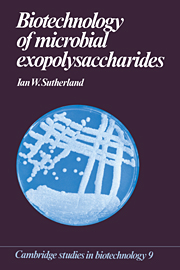Book contents
- Frontmatter
- Contents
- Preface
- 1 Introduction and definition
- 2 Polysaccharide analysis and structural determination
- 3 Exopolysaccharide structure
- 4 Enzymes degrading exopolysaccharides
- 5 Biosynthesis
- 6 Physiology and industrial production
- 7 Genetics, control and regulation of exopolysaccharide synthesis
- 8 Physical properties of exopolysaccharides
- 9 Food usage of exopolysaccharides
- 10 Industrial uses of microbial polysaccharides
- 11 Medical applications of exopolysaccharides
- 12 The future for microbial exopolysaccharides
- References
- Index
5 - Biosynthesis
Published online by Cambridge University Press: 09 September 2009
- Frontmatter
- Contents
- Preface
- 1 Introduction and definition
- 2 Polysaccharide analysis and structural determination
- 3 Exopolysaccharide structure
- 4 Enzymes degrading exopolysaccharides
- 5 Biosynthesis
- 6 Physiology and industrial production
- 7 Genetics, control and regulation of exopolysaccharide synthesis
- 8 Physical properties of exopolysaccharides
- 9 Food usage of exopolysaccharides
- 10 Industrial uses of microbial polysaccharides
- 11 Medical applications of exopolysaccharides
- 12 The future for microbial exopolysaccharides
- References
- Index
Summary
Introduction
The biosynthesis of most exopolysaccharides closely resembles the process by which the bacterial wall polymers peptidoglycan and lipopolysaccharide are formed. Indeed, the three types of macromolecule share the characteristic of being formed of carbohydrates and associated monomers, being synthesised at the cell membrane and exported to final sites external to the cytoplasmic membrane. The only exceptions are the exopolysaccharide levans and dextrans, which are synthesised by a totally extracellular process and whose formation will be discussed later in this chapter.
Formation of the precursors for polysaccharide synthesis occurs within the cytoplasm. This is probably a necessity to ensure that they are thus readily available, as in many cases they are utilised for several different polymer-synthesising systems. As they are freely soluble in the cytoplasm, they can be readily channelled to the appropriate biosynthetic process occurring at or within the cytoplasmic membrane. Elucidation of the initial stages of polysaccharide synthesis has proved more difficult than was the case for polymers found in microbial and particularly bacterial walls. This has been mainly because of the lack of suitable selection systems for obtaining mutants and of antimicrobial agents specifically inhibiting polysaccharide biosynthesis. Even the preparation of cell-free systems or of membrane fragments is rendered more difficult by the presence of the viscous extracellular polysaccharides. Various cell-free systems, including membrane fragments from ultrasonically lysed cells, solvent-extracted cells or cells permeabilised with solvents or chelating agents, have been used.
Mutants have proved useful in studies where it has been possible to obtain microorganisms deficient in precursor synthesis (UDP-glucose pyrophosphorylase or UDP–galactose-4-epimerase, etc).
- Type
- Chapter
- Information
- Biotechnology of Microbial Exopolysaccharides , pp. 54 - 69Publisher: Cambridge University PressPrint publication year: 1990
- 1
- Cited by



